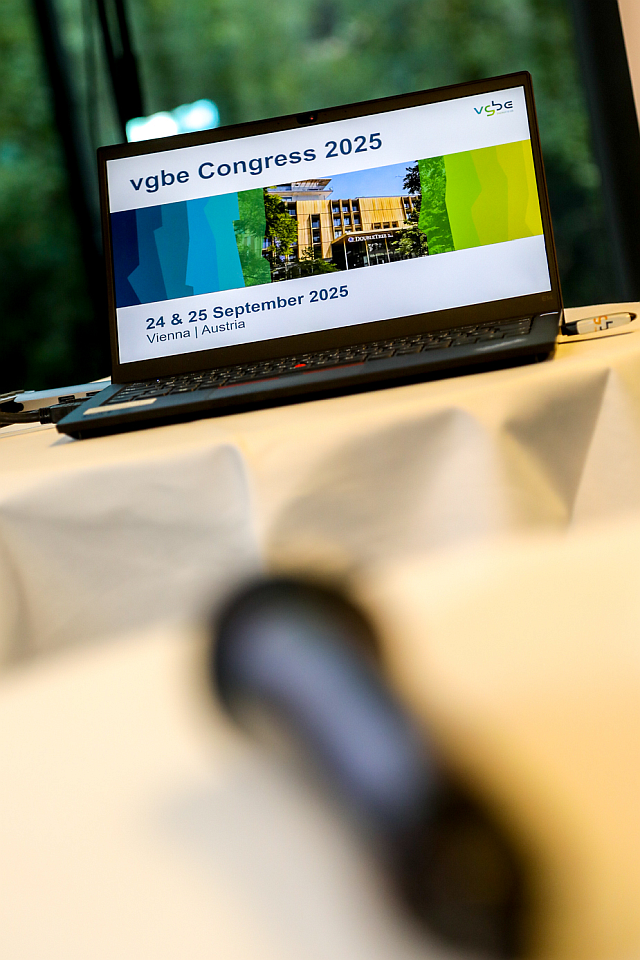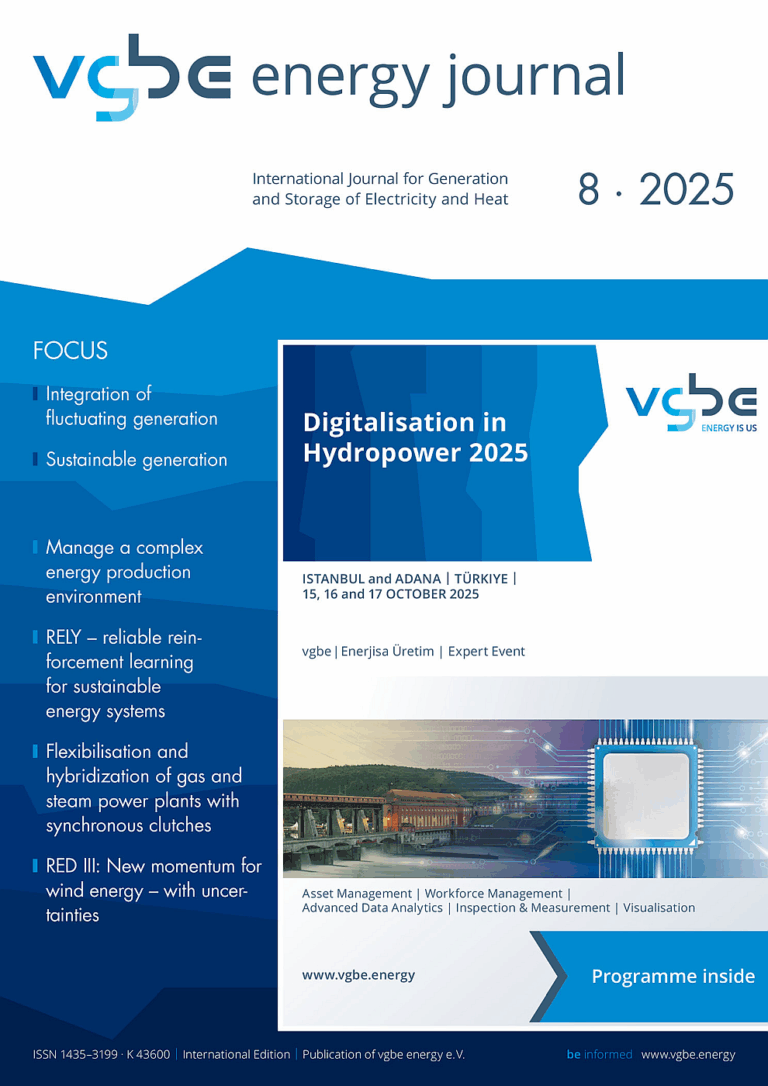vgbe Congress 2025
The transformation of the energy system is one of the largest and most complex projects of our time. It requires technical innovation and a fundamental rethink of politics, economics and society. The goal is to create an energy system that achieves climate neutrality while ensuring security of supply, stability and affordability. In an era of mounting geopolitical tensions and global interdependence, the need for a robust, flexible and interconnected energy system is more pressing than ever.
The vgbe Congress 2025 in Vienna will address these issues, providing a platform where experts from around the globe can come together to find solutions. The discussion will focus on the key challenge of reconciling the energy transition with affordability. The keynote speech, ‘Energy transition and affordability: how can these goals be reconciled?’, will set the tone for all contributions and debates at the congress.
How simulators help to manage a complex energy production environment
Elisabeth Burghart, Sajesh Nambiar and Thi Quynh Do
European energy production businesses are facing changes that are unprecedented in scale and scope. Energy producers are faced with the challenge of meeting higher energy demand while fossil fuel production is being reduced as a matter of policy, doing this by balancing production from physically distributed and largely intermittent sources. In this paper, we explore how simulators have become an essential part of energy production solutions, and we also show how the Siemens Energy Omnivise T3000 control solution, with integral simulation capability, can address today’s key priorities, from training to operations. The challenge faced by energy producers is evolving fast: they require management systems with the flexibility and development potential needed to handle whatever the future brings.
RELY – Reliable Reinforcement Learning for Sustainable Energy Systems
Carlotta Tubeuf, Anton Maly, Hugo Götsch and René Hofmann
In the wake of the energy transition and the increasing share of fluctuating renewable energy sources, the flexibility of storage technologies is becoming increasingly important – in particular the role of pumped storage power plants (PSPPs) as a reliable and proven storage solution. Innovative and adaptive control concepts are needed to ensure that these plants can contribute not only to energy storage but also to the provision of fast system services in the future. This is precisely where the RELY – Reliable Reinforcement Learning for Sustainable Energy Systems research project, funded by the Austrian Research Promotion Agency (FFG) as part of the ‘AI for Green’ programme, comes in. The aim of the project is to make reinforcement learning (RL) methods usable for automated, precise and dynamically adaptable process control in PSKWs.
Flexibilization and hybridization of gas and steam power plants with synchronous clutches
Tina Rühling and Nils Ohlendorf
Highly efficient and flexible combined heat and power plant with exhaust gas condensation and heat pump
Judith Bollmann and Guido Keßeler
The thermal utilisation of renewable biomass is an important option for CO2-free heat and power supply and is also independent of the current wind and weather situation. The most effective energy conversion of the biomass fuel is achieved by utilising the condensation heat from the flue gas. Using a heat pump, the low-temperature heat from the flue gas condensation is utilised, for example, to generate hot water for a district heating network. The article describes the process technology and mode of operation of a typical plant, including technical performance data, and provides an economic perspective of the return of investment. A new biomass CHP plant has been built in Hannover (Germany) in 2024/25 and is being commissioned by Standardkessel Baumgarte GmbH.
MARTIN Waste Stream Analysis (MSA) – A new imaging technique for optimising and automating plant operation in thermal waste treatment facilities
Daniel Böck, Stefan DeYoung, Max Schönsteiner and Axel Hanenkamp
Ten years of excellence: High-performance filtration with P84® composite filter material in poultry litter BFB boiler
Franz Pesendorfer and Stefano Santorsola
Fifty years of coal research – Progress towards low emissions coal and biomass
Stephen Mills and Debo Adams
Viability of LNG trade growth under the EU-US trade deal
GECF Gas Exporting Countries Forum
RED III: New momentum for wind energy – with uncertainties
Christian Grund
Editorial

vgbe Congress 2025
Dear readers of the vgbe energy journal,
The transformation of the energy system is one of the largest and most complex projects of our time. It requires technical innovation and a fundamental rethink of politics, economics and society. The goal is to create an energy system that achieves climate neutrality while ensuring security of supply, stability and affordability. In an era of mounting geopolitical tensions and global interdependence, the need for a robust, flexible and interconnected energy system is more pressing than ever.
The vgbe Congress 2025 in Vienna will address these issues, providing a platform where experts from around the globe can come together to find solutions. The discussion will focus on the key challenge of reconciling the energy transition with affordability. The keynote speech, ‘Energy transition and affordability: how can these goals be reconciled?’, will set the tone for all contributions and debates at the congress.
The programme is wide-ranging and reflects the complexity of the energy transition, particularly with regard to generation. There will be a particular focus on operational experiences that demonstrate how power plants and grid infrastructures are being adapted to meet new requirements. Examples range from flood protection measures at the Dürnrohr energy hub, to Latvenergo’s experience of preparing for synchronisation with the European grid, to projects aimed at increasing hydropower efficiency. These practical insights demonstrate the close relationship between resilience, adaptability and innovation.
Another focus is the hybridisation of existing plants. Whether through combining wind farms with photovoltaics, using battery storage in run-of-river power plants, or implementing resource-saving hybrid battery solutions as part of EnBW’s battery strategy, the contributions demonstrate that hybrid concepts are playing an increasingly important role in ensuring the stability of the overall system.
However, classic topics such as security of supply and system stability also feature. The importance of system inertia, new approaches to fair load distribution in the European electricity system, and the role of synchronous couplings as strategic assets will be discussed, among other things. Practical contributions will also demonstrate how coal-fired power plants can be used for low-emission grid stabilisation.
Decarbonisation is another focus of the congress. This will be examined in terms of both detailed technological issues and strategic perspectives, ranging from current roadmaps for hydrogen to insights into Japan’s strategic energy plan and the opportunities and challenges of CCS. These topics will be complemented by innovative approaches, such as the use of green ammonia as a cross-sector energy carrier, and by sharing experiences with engines based on hydrogen or ammonia.
Several contributions will also focus on optimising and extending the service life of existing plants. The focus will be on strategies for gas and combined cycle power plants, examples of decommissioning and repowering — such as in Komati, South Africa — and innovative approaches to operating coal-fired plants in their final phase. This demonstrates that the existing fleet also plays a vital role in ensuring the transition.
Last but not least, the focus is on digitalisation. This encompasses specific applications, such as VERBUND’s ‘Digital Hydropower Generation’ innovation programme, as well as broader issues of trust in AI-supported systems. Discussions will focus on reliable anomaly detection in power plants, the opportunities afforded by data-based techno-economic assessments of gas turbine plants, and the long-term impact of AI, machine learning and automation on operations.
The breadth and depth of topics covered by the vgbe Congress 2025 demonstrate that the energy transition is a dynamic process with many facets, not a monolithic project. To turn ambitious goals into reliable solutions, technology, operational experience, new business models, political framework conditions and social acceptance must all work together.
The congress in Vienna offers the ideal setting for this. It is a place for professional exchange, international networking, and joint idea development. Discussions will range from concrete project experiences to strategic decisions, creating a forum that connects science, politics and practice equally.
Participants can expect an event that informs and inspires. The vgbe Congress 2025 is therefore more than just a conference; it is a catalyst for the future of energy in Europe and beyond. Those who participate in the discussions here are actively shaping the future and ensuring that the energy transition is technically, socially and economically successful.
Welcome to the vgbe Congress 2025 in Vienna!s
